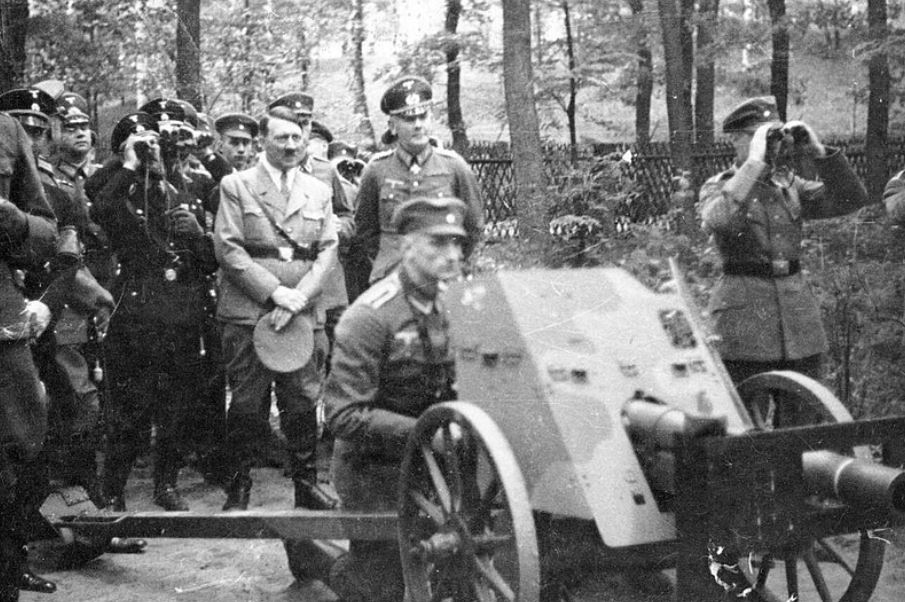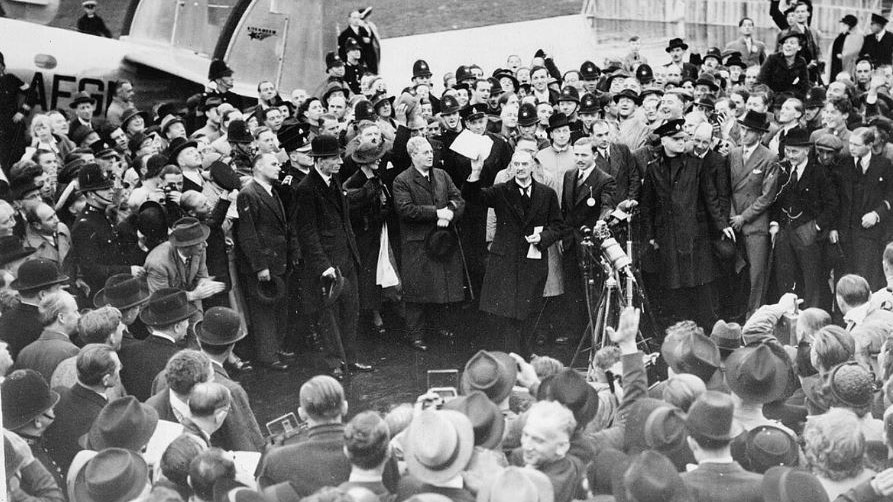World War 2 began in 1939 when Germany invaded Poland. But the roots of the conflict run deeper.
Germany’s decision to go to war was driven by a mix of ideology, economic pressures, and strategic miscalculations. Hitler’s vision for a new world order and the economic realities of his regime played a major role.
Understanding these factors is key to answering the question: why did Germany choose war?
- 1. Hitler’s Vision for Expansion
- 2. Germany's Economic Pressures and their Need for War
- 3. The Impact of Appeasement
- 4. Hitler's Strategic Miscalculations
- 5. The Role of Ideology
- 6. Economic and Military Realities of War
- 7. Could War Have Been Prevented?
- Final Thoughts on Why Germany went to War
- Further Reading
1. Hitler’s Vision for Expansion
Adolf Hitler had clear goals. He believed Germany needed “Lebensraum” or living space.
This meant expanding eastward into Eastern Europe and Russia, as Hitler saw this as necessary for Germany’s survival and prosperity. He argued that Germany’s existing borders were too cramped for its growing population. Whilst, Eastern Europe, with its vast agricultural resources and raw materials, was seen as the key to Germany’s future dominance.
Hitler’s plans were deeply influenced by his belief in racial superiority.
His ideology was rooted in the idea of a racial hierarchy, with Aryans at the top. He viewed the Slavic peoples of Eastern Europe as inferior and thought their lands should be conquered and colonized by Germans.
This belief was tied to his long-term vision of creating a “Greater Germany,” an empire that stretched far beyond the country’s existing borders.
Central to this vision was the elimination of those he considered “undesirable.” Jews, in particular, were labeled as enemies of the state and blamed for Germany’s economic struggles and the loss of World War 1.
Hitler’s racist worldview justified the displacement, enslavement, and extermination of entire populations. He saw the conquest of Eastern Europe as an opportunity to rid the land of these groups and replace them with German settlers.
Hitler’s expansionist aims were not just about land. They were about reshaping the demographic and cultural makeup of Europe.
He wanted to create a racially pure empire where Aryans would thrive at the expense of others. This vision required not only military conquest but also systematic oppression and genocide, which would later culminate in the horrors of the Holocaust and the brutal occupation policies in the East.
2. Germany’s Economic Pressures and their Need for War
Germany’s economy was under severe strain long before the outbreak of World War 2. The country faced a series of financial and social crises that made war not just a strategic goal for Adolf Hitler, but an economic necessity.
The Impact of the Treaty of Versailles
The Treaty of Versailles, signed after World War 1, imposed crippling reparations on Germany. The nation was required to pay enormous sums to the Allied powers, leading to significant economic hardship.
This financial burden led to hyperinflation in the 1920s, wiping out the savings of ordinary Germans.
Families lost their homes, businesses closed, and the middle class was devastated.
The psychological impact of the treaty compounded the economic strain. Many Germans felt humiliated by the loss of territory and the harsh conditions imposed on them. This humiliation fueled nationalist resentment, creating fertile ground for Hitler’s rise to power.
The Great Depression and Its Consequences
The situation worsened with the onset of the Great Depression in 1929.
Global economic collapse led to a sharp decline in German exports, which were a critical component of the economy. Unemployment soared, affecting nearly six million people by 1932. Poverty became widespread, and the Weimar government struggled to provide solutions.
This economic instability eroded public trust in democratic institutions, paving the way for extremist parties like the Nazis.
Hitler capitalized on this discontent and promised to restore Germany’s economy and national pride. His rhetoric resonated with a population desperate for change, securing his ascent to the position of Chancellor in 1933.
Hitler’s Economic Policies
Once in power, Hitler implemented ambitious economic policies aimed at recovery and rearmament.
Massive public works projects, such as the construction of the autobahn, created jobs and reduced unemployment.
The Nazi regime embarked on a massive rearmament program aimed at restoring national pride and preparing for war. The rearmament program created jobs and boosted national morale, but it was not sustainable in the long term and the German economy could not support such massive expenditures indefinitely.
Without significant external resources, the nation was heading toward a financial crisis.
Industrial production was revived, and the military was rapidly expanded. These measures temporarily stabilized the economy and boosted public morale.
However, these policies came at a cost.
Hitler’s government relied heavily on borrowing and printing money, creating inflation and deepening financial instability.
The Nazi regime also relied heavily on deficit spending and by 1939, Germany’s debt had reached unsustainable levels. The economy was teetering on the brink of collapse, and Hitler needed a way to secure additional resources to sustain his regime. By the late 1930s, Germany’s economy was under immense strain, and war became a necessity to avert economic collapse.
War was seen as a solution, offering opportunities for plunder and economic exploitation in conquered territories to fund the regime’s ambitions.
The Role of War in Economic Strategy
War became a central component of Hitler’s economic strategy.
Conquering new territories would provide the raw materials, labor, and wealth needed to support the German economy.
Eastern Europe, in particular, was seen as a treasure trove of resources.
Hitler’s vision of “Lebensraum” (living space) was not just ideological but also economic. Occupying countries like Poland, Czechoslovakia, and eventually parts of the Soviet Union would allow Germany to extract resources and exploit local populations.
Exploitation of Jewish Wealth
The Nazi regime also turned to systematic plunder within its own borders.
Jewish citizens became primary targets. Through policies of Aryanization, Jewish businesses and properties were confiscated and transferred to non-Jewish Germans. This wealth was used to fund the state and its military expansion.
The infamous Nuremberg Laws and other anti-Semitic legislation facilitated this process. By stripping Jewish citizens of their rights and livelihoods, the Nazis were able to seize assets with minimal resistance. This theft not only bolstered the economy temporarily but also reinforced the regime’s ideological goals of racial purity.
War as an Economic Imperative
For Hitler, war was not merely a tool for territorial expansion but an economic imperative.
The fragile state of the German economy left him with few alternatives. Without the resources and wealth gained through conquest, the Nazi economic model would have collapsed.
This urgency to secure economic stability made the outbreak of World War 2 almost inevitable.
The Long-Term Costs
While war initially provided short-term economic relief, it was not sustainable.
The extensive looting and exploitation of occupied territories created resentment and resistance. The costs of maintaining a vast war machine eventually outstripped the benefits of plunder. As the war dragged on, Germany faced severe resource shortages, contributing to its eventual defeat.
Hitler’s aggressive strategies, both at home and abroad, were designed to address these economic challenges, but they ultimately led to the destruction of the regime he sought to sustain.
3. The Impact of Appeasement
Fear of Another War
The policy of appeasement by Britain and France was largely driven by fear.
After the devastation of World War 1, both nations were deeply reluctant to engage in another large-scale conflict, with memories of the trenches, massive casualties, and widespread destruction were still fresh.
Political leaders and the public alike were determined to avoid repeating such horrors. This sentiment influenced their approach to Hitler’s aggressive actions, leading to a strategy of concession rather than confrontation.
Economic and Military Weakness
Both Britain and France were also dealing with economic and military challenges.
The Great Depression had weakened their economies, leaving them less prepared for war.
Military budgets were constrained, and rearmament efforts were slow. In Britain, for instance, much of the 1930s was spent rebuilding its air force and navy, leaving its army comparatively underdeveloped.
France, while heavily investing in defensive measures like the Maginot Line, lacked the mobility and flexibility to counter a German offensive effectively.
Appeasement, therefore, was partly a strategy of buying time. By allowing Hitler to expand without resistance, Britain and France hoped to delay conflict until they were better prepared militarily and economically.
The Rhineland: A Critical Turning Point
The policy of appeasement faced its first major test in 1936 when Hitler ordered German troops into the Rhineland. This area had been designated as a demilitarized zone under the Treaty of Versailles to serve as a buffer between Germany and France. The reoccupation of the Rhineland was a bold violation of the treaty.
France, despite having a strong military presence, chose not to act. Without French intervention, Britain saw no reason to respond either.
This inaction emboldened Hitler, reinforcing his belief that the Allies lacked the will to challenge him. It was a missed opportunity to contain German aggression when it was still in its early stages.
The Anschluss: Austria Falls
In 1938, Hitler set his sights on Austria.
Using propaganda and political pressure, he orchestrated the Anschluss, the annexation of Austria into Germany and was a direct violation of the Treaty of Versailles, which prohibited such a union. However, Britain and France once again stood by.
Many in Britain viewed the Anschluss as inevitable, given the cultural and historical ties between Germany and Austria. There was also a perception that Austria’s inclusion in the German Reich was a matter of self-determination, as some Austrians supported the move.
This rationalization further emboldened Hitler, who faced no significant resistance to his actions.
The Munich Agreement and the Sudetenland
Later in 1938, Hitler demanded control of the Sudetenland, a region of Czechoslovakia with a significant ethnic German population. This led to the Munich Agreement, a key moment in the policy of appeasement. British Prime Minister Neville Chamberlain, along with French and Italian leaders, agreed to cede the Sudetenland to Germany without consulting Czechoslovakia.
Chamberlain returned to Britain declaring that the agreement had secured “peace for our time.”
However, this decision was a short-term attempt to placate Hitler and avoid war. In reality, it weakened Czechoslovakia’s defenses and emboldened Germany.
The Munich Agreement demonstrated to Hitler that he could achieve his goals through intimidation and brinkmanship.
Appeasement’s Fatal Flaw
Appeasement had a dangerous underlying assumption: that Hitler’s ambitions were limited and rational.
Chamberlain and other Allied leaders believed that once Hitler’s territorial demands were met, he would be satisfied. They underestimated the ideological and expansionist nature of Nazi Germany.
Hitler, however, interpreted appeasement as a sign of weakness.
Each concession reinforced his belief that Britain and France were unwilling to challenge him. This perception played a critical role in his decision to invade Poland in 1939, a move that directly triggered World War 2.
The Invasion of Czechoslovakia
Appeasement reached its breaking point in March 1939 when Germany invaded the rest of Czechoslovakia. Unlike the Sudetenland, this invasion had no pretense of self-determination. It was a clear act of aggression and marked the first time Hitler had taken non-German territory.
This invasion shattered the illusion that appeasement could maintain peace.
Britain and France finally realized that Hitler’s ambitions were far greater than they had anticipated. The invasion of Czechoslovakia led both nations to guarantee Poland’s independence, signaling a shift from appeasement to deterrence.
The Road to War
Despite this shift, the damage caused by appeasement was already done.
By the time Britain and France declared war on Germany after the invasion of Poland, Hitler had built a powerful military and gained significant territorial advantages. The Allies’ earlier inaction had allowed Germany to grow stronger, making the eventual conflict far more devastating.
Appeasement, though well-intentioned, ultimately failed to prevent war.
It gave Hitler the time and confidence to pursue his expansionist goals, leading to the most destructive conflict in human history. The lessons of appeasement continue to shape international relations, serving as a cautionary tale about the dangers of conceding to aggression.
4. Hitler’s Strategic Miscalculations
Misjudging Britain and France
Adolf Hitler miscalculated the resolve of Britain and France.
Up until the invasion of Poland, both nations had pursued policies of appeasement, avoiding direct confrontation. This history led Hitler to believe they would continue to avoid war, even as he pushed further into Europe. When Germany invaded Poland on September 1, 1939, Hitler expected another diplomatic compromise, perhaps similar to the Munich Agreement.
However, Britain and France had reached their breaking point and pledged to protect Poland’s sovereignty. On September 3, 1939, they declared war on Germany.
This swift response shocked Hitler, who had not anticipated that Britain and France would abandon their appeasement strategy. His assumption that they lacked the will to fight proved to be a grave error.
The Role of the Nazi-Soviet Pact
The Nazi-Soviet Pact, signed in August 1939, was another strategic miscalculation.
This agreement between Germany and the Soviet Union included a secret clause to divide Poland between the two powers. Hitler believed the pact would deter Britain and France from intervening, as it temporarily neutralized the Soviet Union as a potential adversary.
However, instead of discouraging Britain and France, the pact solidified their decision to confront Germany. It became clear that Hitler’s ambitions extended beyond Germany’s borders and threatened the balance of power in Europe.
Underestimating the United States
Hitler also failed to recognize the United States’ potential as a military power. He dismissed the U.S. as a nation focused on domestic concerns, believing its isolationist policies and public aversion to war would keep it out of the conflict.
This was a critical mistake.
As the war progressed, the U.S. became a decisive force, providing economic, military, and logistical support to the Allies.
These miscalculations set the stage for Germany’s eventual defeat.
5. The Role of Ideology
Hitler’s Vision of Himself as Germany’s Savior
Adolf Hitler’s ideology was central to his decision-making and the war itself.
He saw himself as the savior of Germany, destined to restore its greatness after the humiliation of the Treaty of Versailles and the hardships of the Great Depression. Hitler crafted a narrative where Germany’s problems were not just political or economic but existential, rooted in what he perceived as a racial and ideological struggle.
Hitler’s ideological commitment to Lebensraum depended on the conquest of Eastern Europe and the Soviet Union, which he saw as lands meant for German settlement. This vision was deeply rooted in his racist beliefs, particularly his view of Slavic peoples as inferior and unworthy of their territories.
Hitler envisioned a vast German empire where “Aryans” ruled supreme, and all other groups were subjugated or eliminated. This vision justified the invasions, massacres, and exploitation that defined the war.
Anti-Semitism as a Driving Force
Anti-Semitism was a cornerstone of Hitler’s worldview.
He blamed Jews for Germany’s defeat in World War 1, its economic struggles during the interwar years, and the perceived moral decay of German society. These beliefs were not just prejudices but became guiding principles for Nazi policies. Jews were labeled as enemies of the state, and this ideology justified a series of actions, from exclusionary laws to mass murder.
The war itself became a tool for implementing Hitler’s anti-Semitic agenda.
The invasion of Poland and other territories allowed for the persecution, deportation, and eventual genocide of Jewish populations. The Holocaust was not a byproduct of the war but an integral part of Hitler’s vision for a “racially pure” Germany.
The War Against Communism
Another central aspect of Nazi ideology was the fight against communism.
Hitler viewed Marxism as an existential threat, blaming it for Germany’s internal strife and associating it with Jewish influence. This ideological hatred made the Soviet Union a natural enemy in Hitler’s eyes.
The invasion of the USSR, known as Operation Barbarossa, was framed as both a territorial expansion and a crusade to eradicate communism.
By framing the war as a battle for survival and ideological purity, Hitler motivated his followers and justified extreme measures. This ideological fervor blurred the lines between political strategy and fanaticism, pushing Germany into a war of annihilation.
Ideology as Justification for Aggression
Hitler’s ideology provided a framework that justified aggressive expansion and the brutal policies of the Nazi regime. It transformed Germany’s strategic goals into a moral crusade, convincing millions of Germans to support the war effort. From anti-Semitism to anti-communism to the pursuit of Lebensraum, ideology shaped every aspect of Nazi Germany’s actions.
In the end, this rigid adherence to ideological goals contributed to Germany’s downfall. Hitler’s refusal to prioritize pragmatism over ideology led to catastrophic decisions, including the ill-fated invasion of the Soviet Union and the Holocaust, which drained resources and united the Allies against Germany.
6. Economic and Military Realities of War
Looting of Conquered Territories
The looting intensified as Germany began its territorial conquests.
In Poland, for instance, vast quantities of coal, steel, and agricultural products were shipped back to Germany. Factories were dismantled, and cultural treasures were also stolen.
The occupied populations were forced into labor, further fueling the German war effort.
Similar strategies were employed across Western Europe, with France, Belgium, and the Netherlands systematically stripped of their wealth. Art, gold, and other valuables were transported to Germany, while local economies were redirected to serve German interests.
Greece is a prime example of this exploitative strategy. The German occupation drained the country of food, raw materials, and financial assets, causing widespread famine and suffering among the Greek population. While this plundering temporarily bolstered Germany’s war effort, it came at a high cost. Resistance movements, supply chain disruptions, and the need for constant military oversight made these occupations increasingly expensive and inefficient.
The exploitation extended beyond material resources.
Germany imposed heavy taxes on occupied countries and seized agricultural produce and industrial goods. In some cases, entire industries were dismantled and transported back to Germany. This strategy provided short-term gains but created long-term logistical challenges, as the transportation and administration of stolen resources stretched Germany’s military and bureaucratic capacities.
This exploitation would only temporarily alleviate the economic pressures on the Nazi regime.
Forced Labor as a Resource
Another significant aspect of Germany’s economic strategy was the use of forced labor.
Millions of people from occupied territories were enslaved and made to work in German factories, farms, and infrastructure projects. This labor force became a crucial component of the war economy, compensating for the shortage of German workers who were conscripted into the military.
However, the reliance on forced labor was fraught with challenges.
Many laborers were underfed, mistreated, and worked in terrible conditions, leading to low productivity and high mortality rates. Moreover, resistance from within occupied territories often disrupted labor operations, further complicating Germany’s efforts to sustain its war economy.
The Role of Jewish Wealth in Financing the War
The Nazi regime’s exploitation of Jewish wealth played a key role in its economic strategy.
During the Holocaust, Jewish communities across Europe were systematically stripped of their assets, including money, property, and businesses. This process began with discriminatory laws and escalated to outright confiscation during mass deportations and killings.
The wealth seized from Jewish families was funneled into the German state to finance the war.
This included the proceeds from looted art, jewelry, and financial holdings, as well as the sale of Jewish-owned businesses.
While these resources provided a temporary boost, they were insufficient to sustain a prolonged conflict.
Moreover, the systemic targeting and murder of Jewish populations meant the loss of skilled professionals, business leaders, and workers, further depleting the economies of both Germany and occupied territories.
Resource Limitations and Long-Term Problems
Despite these exploitative measures, Germany faced significant resource limitations throughout the war.
The nation was not self-sufficient in key areas such as oil, rubber, and certain metals. This dependence on imports made Germany vulnerable to Allied blockades and air raids targeting supply lines and industrial centers.
The strain on resources became particularly acute as the war progressed.
The German invasion of the Soviet Union, known as Operation Barbarossa, aimed to secure vital resources such as oil from the Caucasus region. However, the campaign became a prolonged and costly quagmire, draining Germany’s military and economic strength.
Military Overreach and Logistical Challenges
Germany’s rapid territorial expansion created logistical nightmares.
The supply lines required to maintain troops and transport plundered resources stretched thin, particularly on the Eastern Front. The harsh Russian winters and vast distances made it nearly impossible to sustain military operations effectively.
Additionally, Germany underestimated the industrial and military capabilities of its enemies, particularly the United States. Once the U.S. entered the war, its industrial output far outpaced Germany’s, providing the Allies with a significant advantage in weapons, vehicles, and supplies.
The Unsustainable Nature of Plunder
While looting and exploitation temporarily propped up Germany’s economy, these strategies were ultimately unsustainable.
However, Germany’s war economy was built on a foundation of short-term solutions and ideological goals rather than pragmatic planning. The emphasis on racial purity, for example, led to the exclusion and extermination of skilled workers and intellectuals, weakening the economy further.
The Collapse of Germany’s War Economy
By the final years of the war, Germany’s economy was on the brink of collapse.
The Allied bombing campaigns devastated industrial centers, transportation networks, and cities. The inability to replace lost resources and equipment crippled the German military. Hitler’s insistence on prioritizing ideological objectives over practical considerations only accelerated the decline.
In the end, Germany’s economic and military strategies, rooted in exploitation and overreach, could not sustain the demands of a global conflict. The reliance on plunder, forced labor, and conquest provided temporary gains but created long-term vulnerabilities. These economic and military realities were significant factors in Germany’s ultimate defeat.
7. Could War Have Been Prevented?
Despite Hitler’s aggressive ambitions, some historians believe that the outbreak of World War 2 was not inevitable.
They argue that stronger resistance from Britain, France, and other nations during the early stages of Hitler’s rise to power might have deterred him from pursuing war. For example, when Hitler reoccupied the Rhineland in 1936—a clear violation of the Treaty of Versailles—Britain and France chose not to intervene. This lack of action emboldened Hitler, reinforcing his belief that the Allied powers were unwilling to confront Germany militarily.
Similarly, the policy of appeasement, epitomized by the Munich Agreement of 1938, allowed Hitler to annex the Sudetenland without facing significant consequences.
British Prime Minister Neville Chamberlain famously declared the agreement would bring “peace for our time,” but instead, it convinced Hitler that Britain and France would continue to avoid conflict at all costs.
Had the Allies taken a firmer stance earlier, some historians argue, Hitler might have been deterred or overthrown by internal opposition within Germany.
The Failure of International Institutions
The League of Nations, established after World War 1 to prevent future conflicts, also played a role in the lead-up to World War 2. Its inability to enforce collective security measures allowed aggressor states like Germany, Italy, and Japan to act with impunity. The League’s failure to respond decisively to Japan’s invasion of Manchuria in 1931 or Italy’s conquest of Ethiopia in 1935 undermined its credibility. By the time Hitler began his territorial expansions, the international community had little faith in the League’s ability to maintain peace.
Final Thoughts on Why Germany went to War
Germany’s decision to go to war in WW2 was complex. Hitler’s ideological vision, economic pressures, and strategic miscalculations all played a role. Appeasement by the Allies and the failure to confront Hitler early made war more likely.
The consequences of these decisions were catastrophic. Millions of lives were lost, and the world was forever changed. Understanding why Germany went to war helps us learn from history. It reminds us of the dangers of unchecked ambition and the importance of standing against aggression.
Further Reading
If you enjoyed this article, you may enjoy these:






